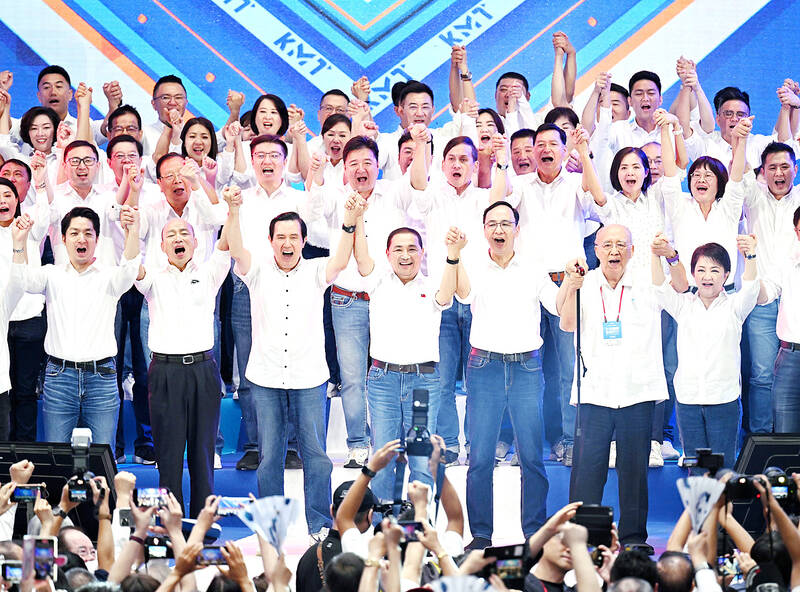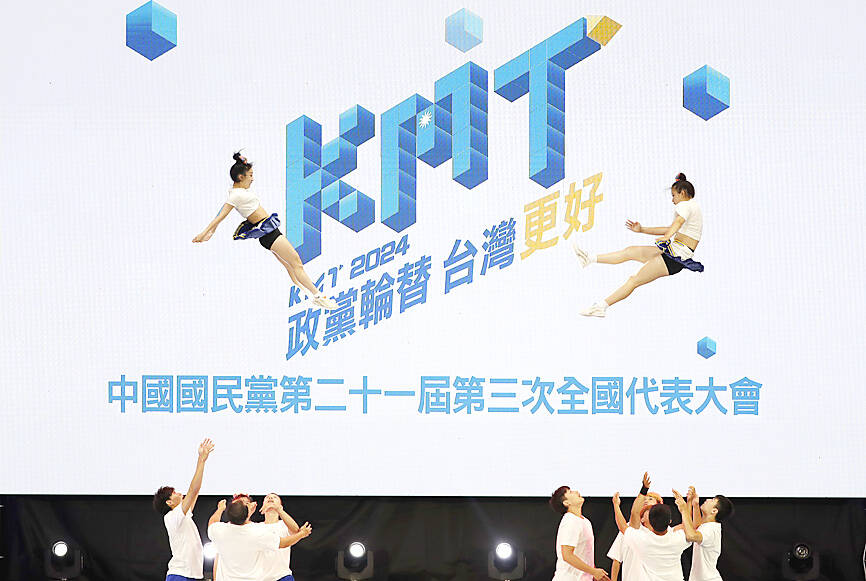The Chinese Nationalist Party (KMT) National Congress yesterday unanimously passed a resolution nominating New Taipei City Mayor Hou You-yi (侯友宜) as the party’s presidential candidate, amid concern that the party might replace him as he continues to lag in the polls.
“Democracy is not decided by the Democratic Progressive Party [DPP]. It is decided by the people. The ruling DPP should go if it is not doing a good job,” KMT Chairman Eric Chu (朱立倫) told party delegates. “Today, more than 60 percent of Taiwanese support a change of the ruling party. Only through such a change can people live better lives.”
Seemingly addressing concerns over the nomination process, Chu said that Hou had been nominated based on party polling and a collective decision by KMT legislators, mayors, county commissioners and political candidates.

Photo: Fang Pin-chao, Taipei Times
Winning the election not only requires the KMT to stand united, it also needs to build alliances with opposition parties, he added.
“We have come to a crucial moment in democracy and a crossroads of peace and war... Our party has encountered many difficulties and turbulence during the presidential campaign, but as long as we stand united and have a strong determination and will, nothing is impossible,” he said.
Chu characterized next year’s elections as a fight against a high crime rate, fraud and privilege created by pro-DPP politicians.

Photo: Chiang Ying-ying, AP
“Hou is a civil servant, the embodiment of justice and an iron mayor. He is going to be ‘iron president’ next year. He will tackle injustice and political corruption by resuming the special investigator system so that we can have a fair and just country again,” he said.
Chu said that the DPP’s nomination of Vice President William Lai (賴清德) for president pushes Taiwan to the brink of war, as he is a vocal supporter of Taiwanese independence.
Prior to the congress, local media reported that some party delegates might use the opportunity to nominate a new KMT chairman and presidential candidate, replacing Chu and Hou. That did not transpire.
However, some delegates asked the party leadership to clarify its positions on cross-strait politics, while others, who are Taiwanese businesspeople working in China, proposed holding a parade opposing Taiwanese independence in October to show the KMT’s determination to remove the DPP from office.
Hon Hai Precision Industry Co founder Terry Gou (郭台銘), who is widely viewed to be a presidential aspirant, wrote on Facebook that the public should “transcend the will of a political party,” adding that he “would play a role that would bring changes” to the country and “a new style to politics and the presidential election campaign.”
KMT Legislator Jessica Chen (陳玉珍), who attended the congress and is a supporter of Gou, said that the tycoon has not changed his position on politics.
“He [Gou] still wants peace across the Taiwan Strait, thinks there should be a change of the ruling party and stands with the people, so that the country can change for the better,” Chen said.
“Paying attention to public opinion is fundamental, and I hope all presidential candidates go to my district in Kinmen County to talk about their positions on cross-strait policies,” she said.
Asked whether she would persuade Gou not to run in the presidential election, Chen said she cannot dissuade anyone, but she believes that Gou would make the best decision for the country.

Taiwanese can file complaints with the Tourism Administration to report travel agencies if their activities caused termination of a person’s citizenship, Mainland Affairs Council Minister Chiu Chui-cheng (邱垂正) said yesterday, after a podcaster highlighted a case in which a person’s citizenship was canceled for receiving a single-use Chinese passport to enter Russia. The council is aware of incidents in which people who signed up through Chinese travel agencies for tours of Russia were told they could obtain Russian visas and fast-track border clearance, Chiu told reporters on the sidelines of an event in Taipei. However, the travel agencies actually applied

New measures aimed at making Taiwan more attractive to foreign professionals came into effect this month, the National Development Council said yesterday. Among the changes, international students at Taiwanese universities would be able to work in Taiwan without a work permit in the two years after they graduate, explainer materials provided by the council said. In addition, foreign nationals who graduated from one of the world’s top 200 universities within the past five years can also apply for a two-year open work permit. Previously, those graduates would have needed to apply for a work permit using point-based criteria or have a Taiwanese company

The Shilin District Prosecutors’ Office yesterday indicted two Taiwanese and issued a wanted notice for Pete Liu (劉作虎), founder of Shenzhen-based smartphone manufacturer OnePlus Technology Co (萬普拉斯科技), for allegedly contravening the Act Governing Relations Between the People of the Taiwan Area and the Mainland Area (臺灣地區與大陸地區人民關係條例) by poaching 70 engineers in Taiwan. Liu allegedly traveled to Taiwan at the end of 2014 and met with a Taiwanese man surnamed Lin (林) to discuss establishing a mobile software research and development (R&D) team in Taiwan, prosecutors said. Without approval from the government, Lin, following Liu’s instructions, recruited more than 70 software

Taiwanese singer Jay Chou (周杰倫) plans to take to the courts of the Australian Open for the first time as a competitor in the high-stakes 1 Point Slam. The Australian Open yesterday afternoon announced the news on its official Instagram account, welcoming Chou — who celebrates his 47th birthday on Sunday — to the star-studded lineup of the tournament’s signature warm-up event. “From being the King of Mandarin Pop filling stadiums with his music to being Kato from The Green Hornet and now shifting focus to being a dedicated tennis player — welcome @jaychou to the 1 Point Slam and #AusOpen,” the